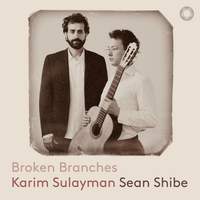Interview,
Karim Sulayman on Broken Branches

A few weeks ago, Broken Branches – a thought-provoking and wide-ranging collaboration between tenor Karim Sulayman and guitarist Sean Shibe – was our Recording of the Week. Exploring musical connections between "the West" and "the East" – whatever those terms might mean, and have meant over the centuries – it encompasses Renaissance lute-songs, twentieth-century English translations of Han- and Tang-era Chinese poems, popular and folk songs from Lebanon and the Sephardic diaspora, and more.
Karim was kind enough to share some of his thoughts on the music on the album, as well as his long-standing musical relationship with Shibe.
You’ve both had considerable success as recitalists and in the recording studio as artists in your own right, and you’ve collaborated in the past from time to time; how did you at last manage to turn that relationship into this duo album?
Sean and I have been talking about doing an album together since we met and first started working together. And when we first looked at Songs from the Chinese we both knew that we wanted to record those songs specifically together. I think this album is a result of good timing and an excitement that we had over the program in general. We didn’t want to make an album that’s been made before, so it was important to explore ideas carefully and thoughtfully. That takes time and trust.
We were given the opportunity to do a recital together at the Aldeburgh Festival in 2022. At that point we were already considering this repertoire, and the team at Britten Pears Arts gave us their blessing to get creative with the programming. I’m really grateful to them for giving us that platform to create and explore, and ultimately find a program that worked both live and on disc.
How does Dowland’s Time stands still, which opens the programme, relate to the other works and themes that make up the album?

The lute as it relates to the oud is one simple answer. Another is noting Britten’s clear consciousness of his own musical heritage and how Dowland inspired him. But in a more abstract and poetic way, time standing still gives us room to play with these notions of musical styles and their points of origin always borrowing from and informing those that come before and after. Much in the same way that we try to illustrate the world as circular without a mile marker of where ‘East’ and ‘West’ begin and end, we look at time in the same way, and want to embrace the chronological spectrum of the album.
When you come across uninformed “Orientalist” representations of the musical “exotic”, such as some of the Renaissance songs featured here, aren’t you sometimes tempted to just ignore them and perform something else?
Haha. Of course. But sitting with discomfort and making sense of things from new perspectives is more rewarding than canceling or ignoring something entirely. Nuance is really important — when making music, of course, or when simply conversing with people, even if you disagree. And we’re blessed as artists to be able to use music to get people to think in a way they may not have before. But also, these composers are wonderful and should never not be performed. I think it’s up to us to make sense of this music from a modern and personal perspective. That’s how we maintain classical music’s relevance. I don’t believe it’s a dying art, and it will thrive when it’s presented authentically and innovatively from the artists of today, and not just presented as museum pieces up for the same interpretations.
How has your approach to Britten’s Songs from the Chinese developed in the decade since you first encountered them as a duo at the Marlboro Music Festival?
I think we have both grown a lot as artists in the time that we’ve known each other. And that’s opened up our interpretations of those songs in a way that I think we didn’t always feel completely free to explore in the confines of “Young Artist” land. When you’re younger, there’s so much emphasis on doing things the “right” way. I think as you grow you learn that the right way is the way that feels you’re bringing your most authentic self to your performances while still honoring what the composer intended as best you can. In that way, I think I’ve come to understand the songs more as myself, and how Sean and I together create a dialogue and a deeper understanding of each other’s interpretations through our sound.
Karim Sulayman (tenor), Sean Shibe (guitar)
Available Formats: CD, MP3, FLAC, Hi-Res FLAC, Hi-Res+ FLAC



